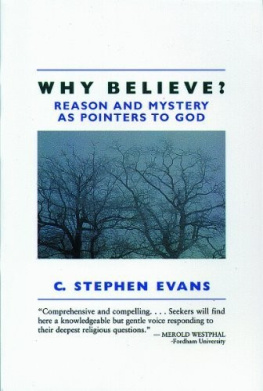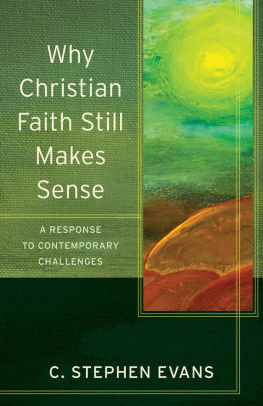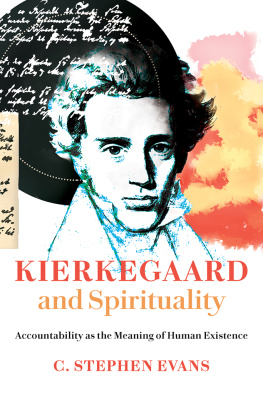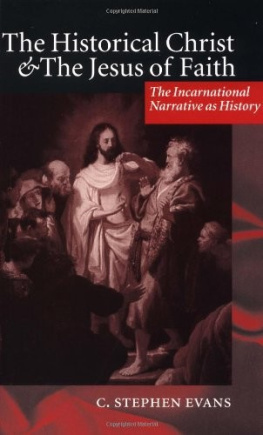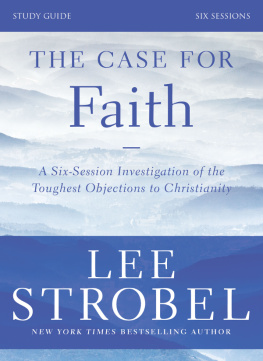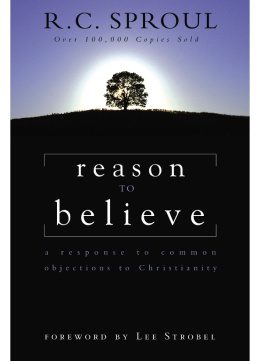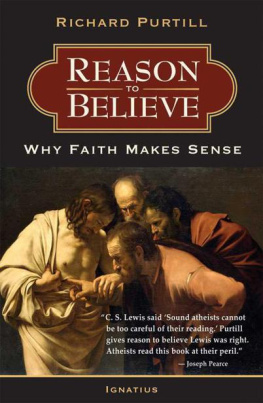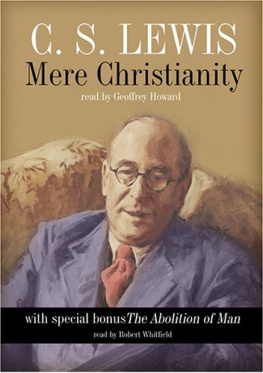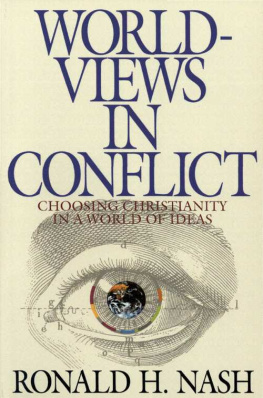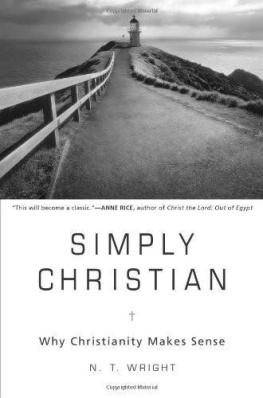WHY BELIEVE?
Reason and Mystery
as Pointers to God
C. Stephen Evans
William B. Eerdmans Publishing Company Grand Rapids, Michigan





To the Mitchells:
David, Dee, and Mark
Contents
ix
Preface
LET'S CALL HIM Andrew. It was my first class as an independent instructor. I was inexperienced but enthusiastic as I set about initiating twenty-two students into the complexities of contemporary European philosophy. Andrew was my most appealing student. He was bright, outgoing, and friendly. We had long talks in and outside class.
As we got to know each other, Andrew became interested in my Christian faith. He found it appealing, but incredible. "I would think having that kind of faith would make life very satisfying," he said one afternoon. "I wish I could believe what you believe. But I just can't."
I tried my best to help Andrew see Christian faith as a live option, but I was, to my knowledge, unsuccessful. After spring vacation I received a brief note from the dean of students, requesting a meeting. There I was informed that Andrew had taken his own life.
Talking to Andrew's parents was one of the most difficult things I had ever done. They had no answers and neither did I. I didn't know why such a talented, seemingly happy young person would have committed suicide, and I still don't. His reasons may have had nothing to do with faith or his lack of it.
Still, something deep inside made me feel that somehow I had failed Andrew. I remembered the wistful tone in Andrew's voice as he expressed his envy of my faith. I learned, too, that Andrew's body had been discovered with several occult religious books spread open around him. Here was a young man who had been seeking for something I had. If I had been successful in communicating my faith to Andrew, I felt, things might have been different.
Besides frustration with my own personal failure, I felt angry at something difficult to define. I was angry at my culture, at the forms of thought that had surrounded Andrew and made it almost impossible for him seriously to consider Christianity - even though he so needed religious meaning that he was willing to look at religious ideas that were rather bizarre, with little intellectual credibility.
Someday I knew I would want to write a book for Andrew, and others like him I have met along the way. I'm sure there are many others in the same situation that I will never meet personally. As I explain in the first chapter, I am under no illusion that religious faith is usually or even ever the result of intellectual argument alone. The roots of faith lie much deeper. Still, the sense that Christian faith is simply unacceptable to a person with an intellect who cares about truth can be a powerful barrier to faith. This book is an attempt to remove that barrier. It will not do so for everyone, but I believe it may be helpful for those who are truly concerned about what life means and are willing to examine or reexamine deeply held assumptions and attitudes. If there is only one such person, I will feel that writing this book was worthwhile, for that one person may be an Andrew. Such a person I will call, following Kierkegaard, "that individual, whom with joy and gratitude I call my reader."
CHAPTER ONE
Thinking about Faith
The inescapable presence of doubt is a constant reminder of our responsibility to truth in a twilight world of truth and half-truth.
Os Guinness, In Two Minds
He found his doubts and gather'd strength He would not make his judgment blind, He faced the spectres of the mind And laid them; thus he came at length To find a stronger faith his own.
Tennyson, In Memoriam
JIM WATCHED Holly stride toward him. He liked Holly's walk; like everything about her it was cheerful, full of life and energy. It was good to see her again. He had met some attractive women at school this fall, but none of them kindled the special spark he felt for Holly. It was funny how he had taken her for granted in high school. How much more special she seemed now that they had spent a few months apart!
Holly hugged him. "Jim, it's great to see you; you're looking wonderful."
"Well, you look pretty good yourself, if these bleary eyes are any kind of judge. I sure had a lot of late-night crams during finals week."
"Now, Jim, you didn't study that hard at school. I know you better than that. Tell the truth. Your eyes are really tired from all those late-night parties."
Jim laughed. "And I suppose they don't have any parties at Ivy League schools?"
The small talk continued as they walked through the park. It was friendly, but Jim felt that there was something on Holly's mind, something she didn't quite know how to bring up. There was a long silence.
"Jim," Holly said at last. "You know in my last letter I said there was something important I wanted to talk with you about."
"Well, sure, Holly. You know I'd be glad to talk about anything on your mind."
"Jim, it's kind of hard for me to talk about this for several reasons. First, I don't really know where our relationship is, how serious you are about me, I guess, so I don't know if what I want to talk about is appropriate."
Jim felt both happy and embarrassed - happy because it was clear that Holly was still serious about him, embarrassed that he hadn't been more forthright with her about his feelings. He had put her into an awkward position.
"I guess I'm at fault there, Holly. I really do care for you, and I should have told you that plainly a long time ago. I don't think I'm ready for any permanent commitments right now, but I have to admit, when I think about the future, I sure think a lot about you."
Holly squeezed his hand and they walked along silently. Finally, Holly began to speak again, still a little hesitant.
"What I want to say, well, you know, when two people are serious about each other, then it's important that they share basic values, don't you think?"
"Why sure, of course."
"That's why we need to talk about Christianity, Jim. You see, last ..."
"Oh, is that all you're worried about," Jim broke in with a relieved smile. "Holly, you don't have to worry about that anymore. I won't pressure you to go to church or anything. In fact, you'll be really surprised to find out how much I've changed in that whole area."
"Jim, you really should have let me finish," Holly said quietly, "but I'm certainly interested in hearing about the changes in your life."

